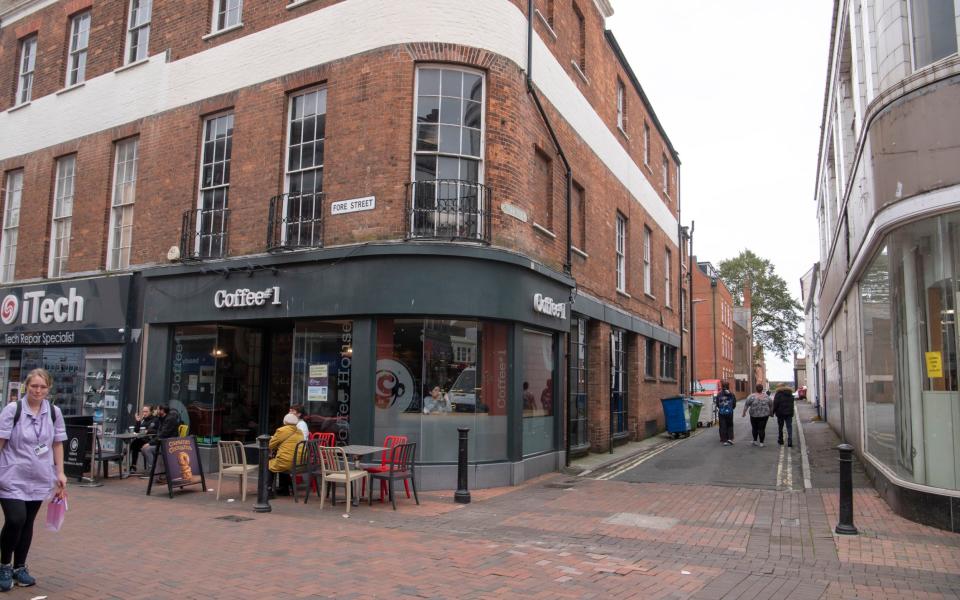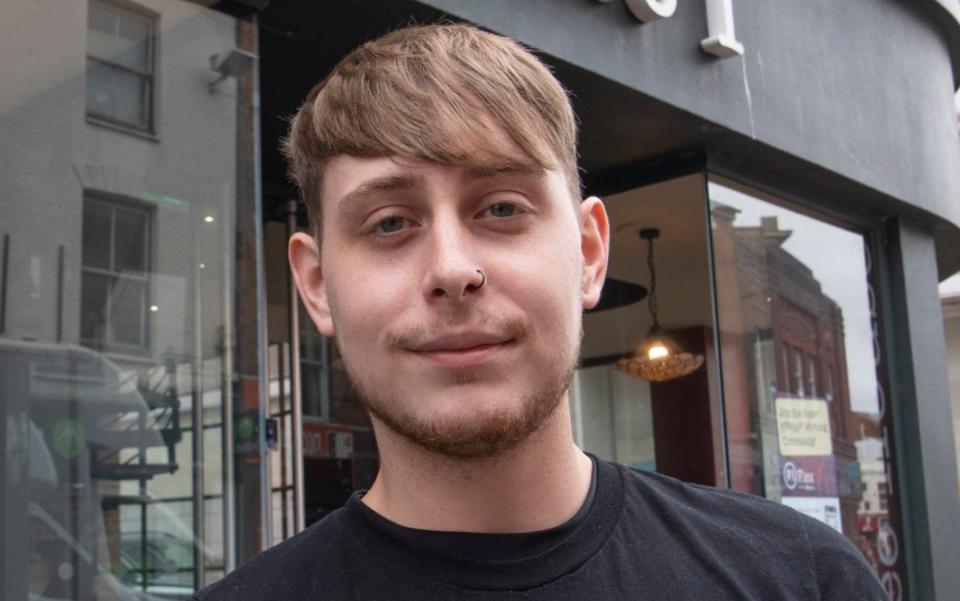
Stroll through the historic market town of Bridgwater in Somerset on a quiet weekday and be swept away by its old-world charm. Grand Victorian architecture lines the streets, which include a busy library. Stop for a pint at the Fountain Inn, overlooking the River Parrett, where friendly locals will welcome you with a soft West Country bite. This week, there’s even a market show supporting local traders.
It is also seen as the business hub of the region, as it is just off the M5, and the new £30 billion Hinkley Nuclear Power Station is less than a 30-minute drive away.
But for all its merits, Bridgwater – like many other towns in the country – has a dark side that drags it down: it is plagued by petty crime and anti-social behaviour.
In recent years, their shops have been overrun by young people who steal with impunity – often wearing scary masks and some carrying knives. And if you stand at the bottom of the main street, even before the clock strikes midday at St Mary’s parish church, you will see the menacing presence of a dozen or so men – some of them homeless or in halfway houses after having recently been released from prison. They are often seen hanging around drinking and openly taking drugs.
These threats to both shopkeepers and residents have become so common that the town is slowly being destroyed.


Bridgwater is a prime example of what the home secretary, Yvette Cooper, says is an area rife with “silent crimes” – nuisance, theft, shoplifting, assaults – crimes that go under-reported but cause huge misery in the community.
At the Labour Party Conference this week, he promised tough action against such behaviour, which will be achieved by recruiting 13,000 new police officers and Police Community Support Officers (PCSOs) along with ensuring local patrols.
He also said police would have the power to target persistent offenders with ‘respect orders’ – a revamped version of ASBOs – which would ban criminals from entering city centres.
As a result of extensive campaigning by the shop workers union USDAW and the Co-op, a new specific crime of assault on a shop worker will be created.
In Bridgwater it may be too little, too late. Some independent shops have closed completely and are standing empty, while others, such as Boots, have boarded up their windows with plywood, recently smashed by local youths. One local says he wouldn’t bring his young child into the city if there was violence or swearing.
“Bridgwater is a great place to live and the people are wonderful,” said Ashley Fox, the town’s Conservative MP. “But like so many other areas, antisocial behaviour is a huge problem. “We need to stop the culture that gives people the benefits they need to spend on drink without getting the help they need to kick their addiction or get into productive work. “Men roaming the streets is unwelcome to shoppers and businesses. If the Home Secretary is keen to tackle this scourge, that’s good, but it needs to be more than just words in a speech. We need to see improvements on the ground.”
At Coffee#1, a café in the middle of Main Street, assistant manager Deacon Greenwood is also skeptical of the idea of a crackdown.


“Crime is out of control and has been for a long time,” he says. “Homeless people are a big problem. We used to let them use our toilets but then we found needles in there and left them. Now they just defecate next to our coffee shop because the council didn’t open any public toilets. It’s terrible.”
He adds that gangs of young people who attack shops sometimes make themselves more dangerous by wearing masks with smiley faces on them.
“We all know who they are,” he adds. “I know some of their names. But nothing is being done because they are teenagers – about 13 or 14. They came here last week and destroyed our upstairs, kicking things and swearing at the staff. The whole town is devastated by it and I’ve noticed new shops have opened just outside the town, away from everything. I don’t know what difference the new powers will make because these kids seem to be able to do anything because they’re so young.”
It’s a similar story on the high street. Some shopkeepers even show us CCTV footage of cheeky kids, some still in school uniform, squeezing behind shop counters to steal vapes. Others say youngsters are lying on scaffolding poles on local train tracks or jumping on local trains and pulling the emergency cable.
The problem has been worse since Covid, says Carina Dimitrescu, manager of outdoor clothing store Millets. It has been exacerbated by the cost of living crisis and the knowledge that children can shoplift with impunity. “Kids come in and run out with hats and gloves on,” she says, “or they bring a bunch of stuff to the counter, pull out their cards to pretend to pay and run away. Homeless people come in to satisfy themselves by stealing North Face jackets and selling them very cheaply. I used to call the police but now I don’t bother except in the worst cases and even then they don’t come. The worst theft recently was when someone stole a rack of T-shirts for about £400. I saw them wearing one in the city the next day.”
Dimitrescu is left with few options, as he is unable to prevent his stock from being stolen in broad daylight. “If I see children coming, I close the doors of the shop,” he adds. “Yes, we are losing customers, but what can we do? And even when I close them, I know the children will kick them because they are violent.”
Like the local MP, he is not sure that the interior minister’s new policy of repression will work. “The problems have been there for so long. Why is no one being prosecuted? Or even fined?” he asks. “Why is it legal to wear a mask in the street during the day? Why are the police so poorly resourced that we don’t even report it? It makes me very angry. Where I come from in Romania, there is no such problem. I want to catch these kids and arrest them. But of course I would go to jail.”


The problem is not just limited to Bridgwater. According to the Office for National Statistics, 2023 was the worst year on record for shoplifting, with more than 430,000 incidents recorded across the UK, up more than a third on the previous year.
The British Independent Retailers Association (Bira) says one in two small businesses is affected by a rise in theft. Meanwhile, the British Retail Consortium reported that violence and harassment towards shop staff had risen by 50 per cent in the year to September 2023, reaching 1,300 a day.
But this town is at least trying to fight back. Every Friday afternoon at Coffee#1, the local council runs a youth group to tackle anti-social behaviour. “There’s drinks and board games and it’s a good idea,” says Greenwood. “But to be honest, no one comes.” Local businesses have held meetings to discuss the issue because, as one trader known as Katie told the BBC: “The money is just pouring in.” [of our businesses] “Because we can’t continue to trade when visitor traffic is halved.”
In February, the local council took the relatively extreme decision to increase the rate of council tax to help fund the local police. This came after a 12-week consultation with fed-up residents, which found 70% supported an increase of £10 or more to boost police resources, and 45% supported a £20 increase. In practice, the increase would result in residents living in the average Band D property – worth between £68,000 and £88,000 – paying £13 more a year.
Indeed, on our visit, the police were in full force. At one point, four community workers were seen helping to rescue a man with dementia who had escaped from a local hospital. Another spent much of the day chatting to locals beneath the Victoria Corn Exchange. “I don’t know what powers the new Home Secretary will bring in,” one officer said of the planned raid.
“We already have the power to ban and remove disorderly people. We usually remove groups of men, but that just pushes the problem elsewhere.” But despite the apparent policing, some doubt that anything is really being done to tackle the youth in particular.
A local resident in his early thirties says: “I tell my wife not to come to the city and if she does, definitely not to bring our two-year-old child. He came once and was just sweared at, so it’s not worth it.
“Sometimes I come into the city centre alone and you see the police chatting and laughing with the troublesome kids. They don’t do anything about it. Come Saturday, when the gangs are looting the shops, you’ll see how little the police do. So even if they have new powers, what will actually change?
“Bridgwater used to be good and there’s so much potential here, especially with the nuclear power stations nearby. But now we’re all trying to avoid it. It’s very sad.”